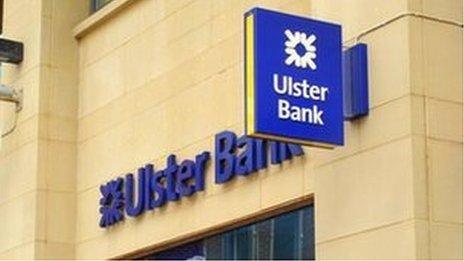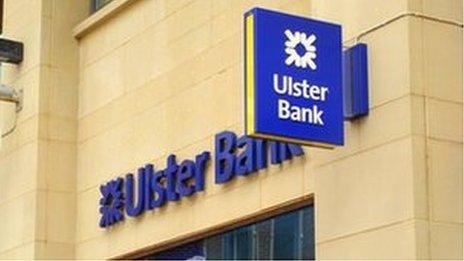Ulster Bank crisis shows importance of human/computers balance
- Published
- comments

Ulster Bank customers have had problems accessing their accounts for more than two weeks
Driving through Comber this morning, I passed a queue of frustrated looking customers waiting for the local branch of the Ulster Bank to open its doors.
On the car radio, Stephen Nolan was making his way across a road towards the headquarters of the bank in Belfast city centre, accompanied by an angry soon-to-be bridegroom, whose wedding plans looked in tatters thanks to the bank's cyberspace meltdown.
The politicians are weighing in, meeting RBS bosses and calling for extra staff to be devoted to fixing the notorious "glitch".
But there are limits to what MLAs and MPs can do.
Balance
As Sammy Wilson put it on Tuesday whilst responding to an urgent question on the bank crisis, "neither jumping up and down by the finance minister in the assembly nor intervention by the chancellor or the finance minister in the Republic will resolve what is, basically, a technical issue".
But once the "geeks" (as Mr Wilson described them) have done their work, there are wider policy issues to be considered.
It's not just the question of compensation, although that might understandably be exercising many Ulster Bank customers, but also the balance society strikes between computers and human beings.
All banks, not just the Ulster, appear intent on saving salaries by shutting less popular branches and urging their customers to process their transactions online.
Whilst this may be an attractive option to the bean counters, have they factored in the need for resilience? That is, what is their back up plan should the "computer say no"?
It's not just a question of crisis management. The recent Spotlight documentary on the sad case of Warrenpoint woman Beatrice Irvine highlighted the vital role real human beings can play in spotting whether a customer's deposits and withdrawals are normal or suspicious.
In that case, the judge praised the vigilance of the Nationwide building society staff who noticed some highly irregular behaviour.
Resilience planning
It's possible to argue that if the "sub-prime mortgages" thought to be at the root of the economic downturn had been processed at close quarters by traditionally cautious banking staff, rather than bundled up via computer technology into deceptively attractive "financial products", we might not be in quite such a mess today.
Computers have enabled communications and business to take off in ways never dreamt off, but there are inevitable downsides in terms of job losses, personal customer care and - as we have seen at the Ulster Bank - the potential for real calamity.
Getting the balance right between computers and humans isn't just a challenge for the bankers - with more government services being delivered online there's a need for those championing such changes to also consider their resilience planning.
Just as the engineers took the strain during the great Northern Ireland Water freeze/thaw crisis, now we must all hope the "geeks" and computer boffins can get the cash flowing through people's accounts as soon as possible.
But once they have finished their technical labour, the politicians and the policy advisers need to take a look at what has happened over the last few weeks and learn some hard lessons.
- Published4 July 2012

- Published4 July 2012

- Published2 July 2012
